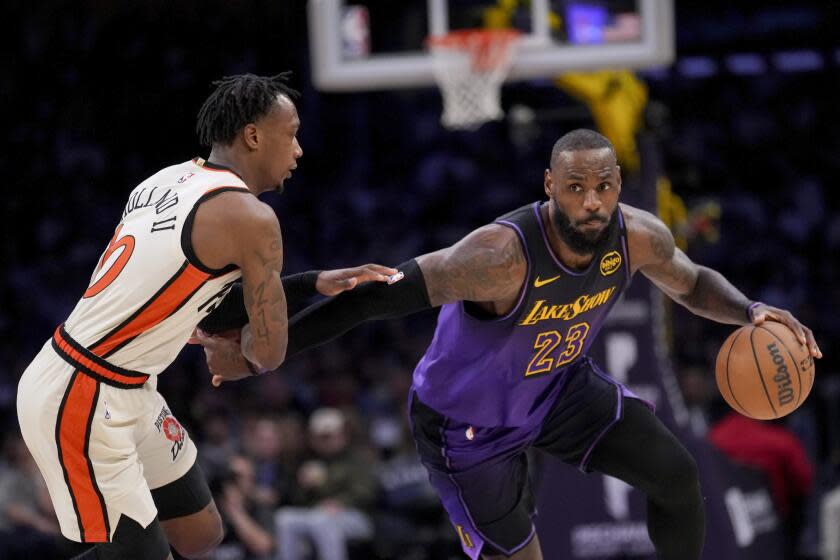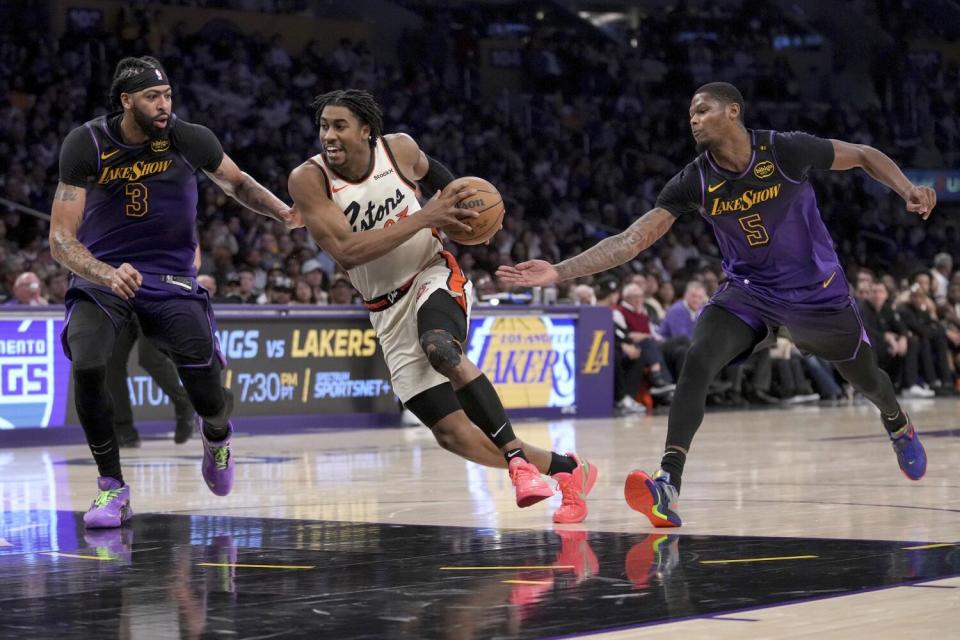
Identity in the NBA, the foundational qualities that define how a team will play most nights, are almost always forged over the course of a season.
The Lakers began the season convinced they would need to simply outscore their opponents because of their defensive liabilities. Then, in a 180-degree turn, an improved defensive effort helped fuel their recent run of strong play — the team simply pouring more energy into that area of the court.
But what about the parts of identity that can’t be learned? What about the things that just are?
On Monday night against the Detroit Pistons the Lakers, at times, played with speed. They were, at times, able to play with physicality.
Read more: Lakers rally late, then hold off Kings for another win
But the Lakers, on most nights, are simply a roster trying to be those things. And against a team such as Detroit, one that doesn’t have to try to be physical or athletic, it’s crystal clear what the Lakers aren’t — big, strong or particularly athletic.
LeBron James has made a career of owning those traits at levels that no one else could match. But 22 years in the NBA has provided a template for how to bully smaller players, the Pistons hunting the smaller Lakers with Cade Cunningham and Detroit’s younger, stronger and tougher players battering them for a 117-114 win.
Cunningham needed 25 shots to score 20 points, but there was a cumulative effect to the effort and energy it took the Lakers, particularly Max Christie and Austin Reaves, to try and slow down the former No. 1 pick. It wasn’t all at once. But the sum of the spent energy undoubtedly bled into other areas.
The Lakers (16-13), who trailed by as many as 11 in the fourth after getting bruised for most of the second half, got to within three in the final 30 seconds. But Anthony Davis missed a driving layup. And while a foul got called, Detroit challenged, and officials overturned the decision.
[embedded content]
The Pistons (13-17) and Cunningham again went at Reaves, with the Lakers guard forcing a late-clock miss. The team had 3.7 seconds and one last chance to get a tie, but James missed an open three just before the buzzer.
“It was something we work on,” James said of his final shot. “We work on end-of-game stuff every day. We got the look we wanted and it just didn’t go.”
Monday’s loss was a testament to the Lakers’ growing understanding of the way they need to play, aided by some welcomed offense provided by 14 successful three-pointers — the most for the Lakers in five games.
And physically, the Lakers did fight — just not with as much comfort as the Pistons.
No Laker had a second foul called on them until there was 4 minutes 20 seconds left in the game. And Detroit’s muscle certainly contributed to the Lakers’ 20 turnovers, mistakes that led to 28 Pistons points (the Lakers scored only nine off 12 Detroit turnovers).


“We were just loose with the ball,” Davis said. “…We were trying to make the right plays. But they do a good job of creating turnovers and it’s hard to win a game with 20. But we’ve just got to be better with the basketball. Everybody. I think that’s what was the difference in the game.”
Reaves had six of those turnovers, saying afterward that he needed to play better.
“They’re a really aggressive defensive team, and myself personally, I didn’t handle it well,” he said.
James led the Lakers with 28 points, 11 rebounds and 11 assists. Each of the other four starters scored at least 10, but ex-Laker Malik Beasley scored 21 off the Detroit bench. The Pistons’ reserves outscored the Lakers’ 52-28.
But the tone of the game was set by how Detroit won the minor battles that define possessions, the ball pressure that knocks a team out of rhythm, the grabbing that makes a screen slightly more effective, the shoving under the glass that leads to an extra possession.
The Lakers have countered it before — just not consistently. There are things the Lakers can do to make more physical teams less of a problem. But there’s probably not much they can do to make that problem go away completely.
“We gotta be stronger. That’s all,” James said. “…We gotta do it as a team. We gotta help guys get open. When guys are pressuring the ball, you gotta help guys screen better. You gotta screen better. … You gotta use your triple-threat (position). When you have a live dribble, get guys up off you.
“It’s not something you can learn, though. You don’t learn to be more physical. It’s either in you or it’s not.”
Sign up for our weekly newsletter on all things Lakers.
This story originally appeared in Los Angeles Times.
